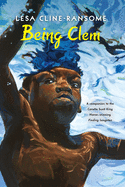
In this stirring final novel in Lesa Cline-Ransome's Finding Langston trilogy, one boy's experience after losing his father is woven into the vastness of the Black experience in 1940s Chicago during the Great Migration.
Clem's father, a navy soldier, died in San Francisco's infamous 1944 Port Chicago munitions explosion, along with hundreds of other Black sailors. The effects of the disaster ripple out to nine-year-old Clem and his family: his depressed mom must go to work as a maid for a wealthy white family and Clem himself is unsure he'll ever measure up to his "big, strong, and in charge" father. This smart kid is scared to swim, to choose his own friends, to stand up for himself and others. Clem wonders if his only strength is his brains. At school, he befriends two boys with whom he has little in common. Although the bullying ways of Lymon (featured in Leaving Lymon) and Errol make him uncomfortable, the protection they offer from other bullies is, at first, a compelling reason to stick by them. But when their persecution of the new boy, Langston (introduced in Finding Langston), goes too far, Clem begins to act on his own, finally to know what it means to "be" Clem. "There ain't nothing brave about beating on someone who doesn't want to fight back."
Coretta Scott King Author honoree and Scott O'Dell Award medalist Cline-Ransome incorporates events of mid-century American history so seamlessly, young readers may not realize they're absorbing real historical facts. Being Clem, which includes an informative author's note at book's end, works beautifully as a stand-alone or as a companion to the earlier novels in the trilogy. --Emilie Coulter, freelance writer and editor

